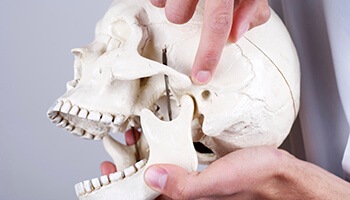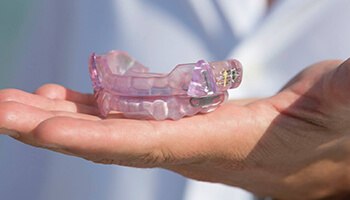Alleviate Chronic Pain with TMJ/TMD Therapy in Columbus
What is TMJ/TMD?
 Every day, millions of Americans deal with facial and neck pain, a stiff and sore jaw, as well as chronic headaches and earaches. In many cases, these can all be caused by something called a Temporomandibular Joint Disorder, or TMD.
Every day, millions of Americans deal with facial and neck pain, a stiff and sore jaw, as well as chronic headaches and earaches. In many cases, these can all be caused by something called a Temporomandibular Joint Disorder, or TMD.
Your temporomandibular joints, or TMJs, are the set of small hinges that connects your jaw to your head, and they allow it to move smoothly whenever you eat, speak, laugh, or yawn. Sometimes, these joints can become strained or injured, which can not only restrict their movement but cause all the symptoms we listed earlier as well.
A Temporomandibular Joint Disorder can be caused by stress, trauma, parafunctional habits, diet, the anatomy of the joints, bite alignment, medications, metabolic disease, psychological disorders, and improper growth and development of the jaw.
Symptoms of TMD Include:

- Pain, soreness, or stiffness in the jaw.
- Pain, ringing, or stuffiness in the ears.
- Frequent headaches, neck aches, or earaches.
- Constant popping and clicking whenever you move your jaw.
- A noticeable change in how your bite comes together.
- A jaw that becomes stuck or “locked-up” when opening or closing.
If You Are Experiencing Any of These Symptoms:

- Be mindful to not clench or grind your teeth during the daytime.
- Avoid chewing any gum.
- Try to chew food on both sides of your mouth equally.
- Avoid sitting with your chin resting on your hands.
- Do not eat hard foods or chew on ice.
- Try to limit any physical trauma or stress to the jaw.
- Reduce your stress in your daily life.
- Use cold compress during episodes of TMD pain.
- Do not open your mouth wide.
Many patients with TMDs have no history of trauma to their jaw and haven’t undergone orthodontic treatment. If you are experiencing any of the symptoms we have mentioned here, you may well be suffering from a TMD. Fortunately, Dr. Amin Mason is trained to diagnose and treat a wide variety of TMDs. To get the relief you need, please contact our office for a consultation.
TMJ/TMD FAQs
Your TMJ is a delicate, complex joint. Even after reading the above information, you may still have questions about it and the treatments that can address TMDs. That is why we have compiled the following list of FAQs, along with their answers. If you do not see the information you were hoping for, you are more than welcome to contact us directly.
Who Is Most At-Risk for TMDs?
Individuals of any age, ethnicity, or background can develop a TMD. However, there are certain groups wherein these conditions tend to occur more frequently. For example, women seem to be more vulnerable than men, and individuals between 30 and 50 years of age suffer from TMDs more often than those in other age groups.
Could My Back Pain Be Related to a TMD?
The human body is a complex network of systems; everything is connected. As researchers dive deeper into how issues with the TMJ can affect other parts of the body, they are discovering that TMDs are often associated with a range of issues, even in areas that are nowhere near the jaw. In fact, many believe that TMDs are descending conditions, which means that can start a chain reaction that puts the entire musculoskeletal system out of whack. It is certainly possible that your back pain is related to a TMD.
Will My TMD Go Away on Its Own?
In some cases, patients who “tough out” TMJ pain or rely solely on at-home remedies find that their symptoms seem to vanish on their own after a while. That isn’t necessarily a good sign because the underlying issue that caused the pain may still exist. It’s certainly worth your time to consult a professional about your jaw pain and other possible indicators of a TMD.
What Will Dr. Mason Do to Relieve My TMJ Pain?
Dr. Mason will talk to you about your symptoms and carefully evaluate the position of your jaw and teeth. Using that information, he will strive to determine the root cause of your pain before he recommends a treatment. Orthodontics may be able to shift a misaligned bite that is causing a TMD. A removable splint, which repositions the jaw and helps it to relax, is another popular treatment option. If noninvasive forms of treatment are not effective at helping you find relief, Dr. Mason might refer you to a qualified surgeon.
Can a TMD Return After Treatment Is Completed?
The TMJ must put up with a lot of stress on a daily basis. Hence, even after it seems that a TMD has been resolved, symptoms may return due to new pressures placed on the jaw and the surrounding facial muscles. If that happens to you, we recommend that you seek treatment as soon as possible so you can minimize your pain and keep your jaw functioning as well as possible.

